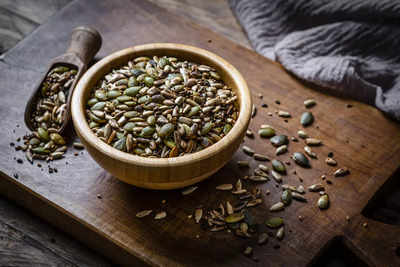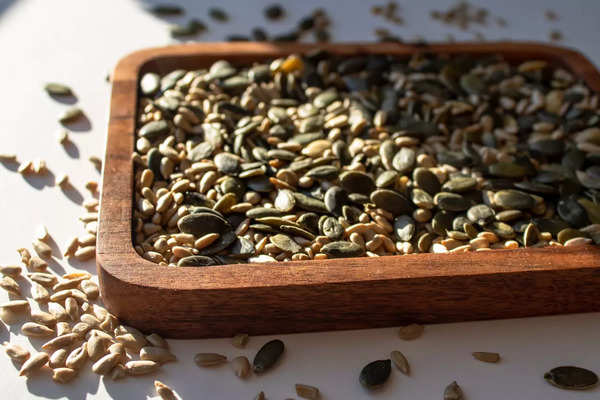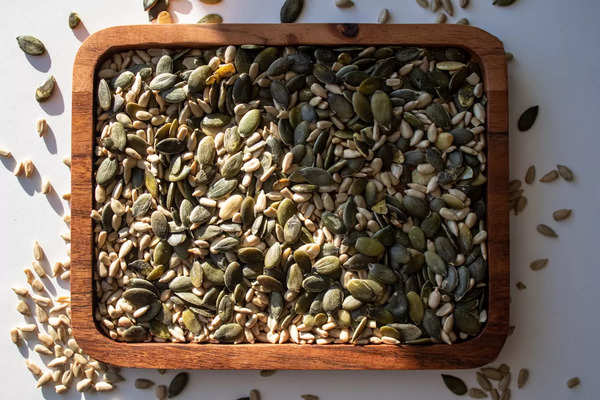

Both pumpkin seeds And sunflower seeds offer impressive skin benefits due to their high nutritional value, but they differ slightly in what they can do for skin health. Both seeds are packed with essential vitamins, minerals, antioxidants and healthy fats that nourish the skin, making them popular additions to skin care diets. Let’s explore the skin benefits of both pumpkin and sunflower seeds and break down which ones seed may be better suited to specific skin needs.
Nutrition Breakdown: Pumpkin Seeds vs. Sunflower Seeds
Pumpkin seeds, also called pepitas, and sunflower seeds are packed with essential nutrients such as vitamins E and B, zinc, magnesium and healthy fats, all of which are beneficial for skin health. Here’s a quick comparison:
Pumpkin Seeds: Rich in zinc, magnesium, omega-3 fatty acids and antioxidants, pumpkin seeds support skin healing, reduce inflammation and help maintain skin elasticity. They are also high in it vitamin Ethat protects the skin against environmental stressors and promotes skin recovery.

Sunflower Seeds: Sunflower seeds are high in vitamin E, selenium, copper and fatty acids and also provide significant skin health benefits. Vitamin E in sunflower seeds acts as a powerful antioxidant and fights free radicals that can lead to premature aging and skin damage.
Both seeds have unique nutritional profiles that make them beneficial for skin health in different ways.
Pumpkin Seeds: Best for its anti-inflammatory and healing benefits
Pumpkin seeds contain a lot of zinc, a mineral known for its skin-healing properties. Zinc promotes collagen synthesis, which is essential for skin repair, aids in wound healing and reduces acne-related inflammation. This makes pumpkin seeds especially beneficial for people who suffer from acne-prone or inflamed skin. The omega-3 fatty acids in pumpkin seeds also reduce inflammation and help soothe irritated or sensitive skin.
In addition, magnesium in pumpkin seeds can lower cortisol levels, a stress hormone that when increased in concentration often leads to pimples and dull skin. Lowering cortisol through magnesium intake can also improve sleep, which in turn supports overall skin health by giving the skin time to repair and regenerate.

Pumpkin seeds are also rich in antioxidants, including carotenoids and vitamin E, which protect the skin against oxidative stress and UV damage. These antioxidants help keep skin looking youthful and vibrant by fighting fine lines, wrinkles and other signs of aging.
Sunflower Seeds: Superior for hydration and anti-aging
Sunflower seeds are an excellent source of vitamin E, one of the most powerful antioxidants for skin protection and hydration. Vitamin E helps retain moisture, making it ideal for those with dry or dehydrated skin. This moisture-retaining ability is beneficial for maintaining skin elasticity and preventing fine lines and wrinkles. For people who struggle with skin that is easily affected by environmental factors such as sun exposure and pollution, sunflower seeds can provide extra protection.
In addition to vitamin E, sunflower seeds contain selenium, a mineral that works closely with vitamin E to repair the skin and prevent damage from UV rays. Selenium also supports skin elasticity and is beneficial for reducing inflammation, which can help those with acne-prone or sensitive skin. Additionally, copper in sunflower seeds helps in the formation of collagen and elastin, both of which are crucial for maintaining firm and youthful skin.
The healthy fats in sunflower seeds, especially linoleic acid, are beneficial for repairing the skin barrier and preventing water loss. A stronger skin barrier leads to softer, more resilient skin that is more resistant to environmental influences.
Which seed is better for your skin?
The choice between pumpkin seeds and sunflower seeds ultimately depends on your specific skin problems:
For acne-prone or inflamed skin: Pumpkin seeds may be more beneficial due to their high zinc and magnesium content, which help reduce inflammation, regulate sebum production and support skin healing. If you suffer from hormonal breakouts or inflammation, the anti-inflammatory properties of pumpkin seeds can work wonders.
5 Seeds that can help with rapid weight loss
For dry or aging skin: Sunflower seeds are a better option because they are richer in vitamin E and healthy fats, which keep the skin hydrated and help prevent wrinkles. Their ability to support collagen formation and elasticity also makes them ideal for those looking to combat fine lines and maintain a youthful appearance.
Both pumpkin seeds and sunflower seeds can be beneficial for your skin, and including both in your diet can provide a wide range of skin benefits. While pumpkin seeds are more suitable for acne-prone and sensitive skin types, sunflower seeds excel at hydration and anti-aging support. For a comprehensive approach to skin health, consider incorporating both types of seeds into your diet, as each has unique properties that can keep your skin looking and feeling its best.